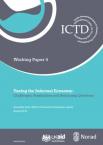ICTD Working Paper 6
Recent years have witnessed rapidly growing donor interest in tax issues in the developing world. This reflects a concern with revenue collection to finance public spending, but also recognition of the centrality of taxation to growth, redistribution and broader state-building and governance goals. Against this backdrop, this paper identifies a series of key issues that demand attention if donors are to improve the quality of their support for tax reform. The focus is not, primarily, on the technical design of tax interventions, but, instead, on seven ‘big picture’ considerations for the design of donor programmes: (a) supporting local leadership of reform efforts; (b) incorporating more systematic political economy analysis into the design and implementation of reform programmes; (c) designing tax reform programmes that seek to foster broader linkages between taxation, state-building and governance; (d) paying careful attention to the complexity of the relationship between aid and tax effort; (e) better designing tax-related conditionality, particularly by developing a more nuanced set of performance indicators; (f) ensuring the effective coordination of donor interventions; and (g) paying greater attention to the international policy context, and particularly the role of tax exemptions for donor projects, tax havens and tax evasion by multinational corporations (MNCs) in undermining developing country tax systems.
